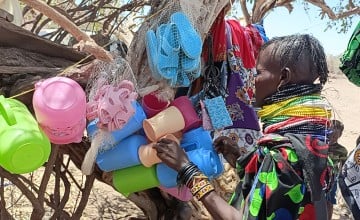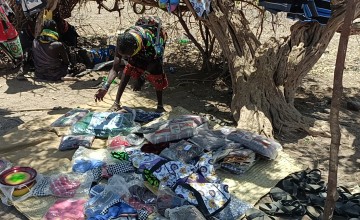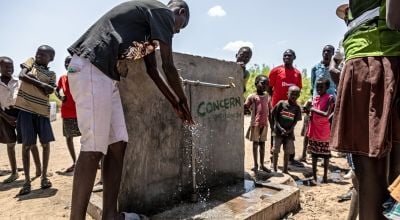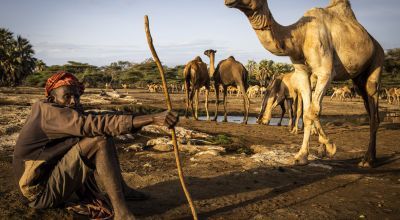
Read our 2024 annual report

Knowledge Hub
A devastated mother breathes a sigh of relief as she sees her children - who had travelled to a neighbouring country with livestock, hoping to access water and pasture - return home. She thanks God the children are safe, but the animals were all taken and now the family faces starvation.
Rebecca Akai Ewoi is a mother-of-seven, who lives in Turkana, Kenya, an area which recently suffered its worst drought in decades. Some parts of the region did not have any rain for three years, which devastated crops and caused cattle, goats, camels and sheep to die, leaving pastoralist families like Rebecca’s on the brink of starvation, with no food or source of income.
Giving support where it's needed most
Concern Worldwide - in partnership with the Kenya Cash Consortium, through humanitarian funding from the European Union - is supporting families like Rebecca’s through multi-purpose cash transfers.
The Kenya Cash Consortium, together with ASAL Humanitarian Network (AHN), delivered multi-purpose cash transfers to 11,926 households (67,847 individuals) in Kenya who have been affected by drought.
Between May 2023 and October 2023 alone, the cash assistance targeted 2,003 households at a monthly cost of 9,306 Kenyan shillings (€56.89) per household.
Multi-purpose cash assistance is one of the most cost-effective ways to support people in places where the market is still working. It also allows individuals to address their most urgent needs.
'Animals started dying'

Rebecca (38) said: “The drought came three years ago, the rain stopped and all the animals - including goats and sheep - started to become weak and emaciated due to lack of food. Vegetative cover dried up because of the drought and a few months later, the animals started dying.
“Some of the residents here decided to move with their animals in search of pasture - unfortunately all their animals were raided and some other people died while trying to defend their animals from the raiders. Those who managed to come back from across the border arrived home empty-handed with no animals, with no food.
“When they came back, they found out that drought had affected many people here at home and life was difficult.
“There are few people in this village because many people decided to migrate to other areas to look for food. The few people who are here are the ones who have been supported by ECHO and Concern Worldwide’s project."
Rebecca sent some of her older children with their few remaining cattle to South Sudan in search of access and pasture, but the animals were stolen.

At the peak of the drought, Rebecca’s family sometimes could not eat at all and had to rely on borrowing from friends and family. To make matters worse, inflation caused food prices to soar, and Rebecca’s youngest child became severely malnourished.
We used to eat three meals in a day when food was available but when drought came, we could only eat once a day when we were lucky.
She continued to say: "Most of the time we stayed hungry for a few days and we could only survive on water.”
Rebecca said that she feels more confident that her family will survive if the drought happens again, thanks to the multi-purpose cash transfers.
She received 27,900 Kenyan shillings (€117.26) over three months. Rebecca invested some of the cash into setting up a shop, selling items including clothes, shoes, jugs and bed sheets.
Rebecca said of her hopes for the future: "We are very happy because with the money we have been able to buy food. I also decided to start my own business to cushion me from future droughts.''
Our impact in 2024
people reached through our emergency response
people reached through our health interventions
people reached through our livelihoods programmes




